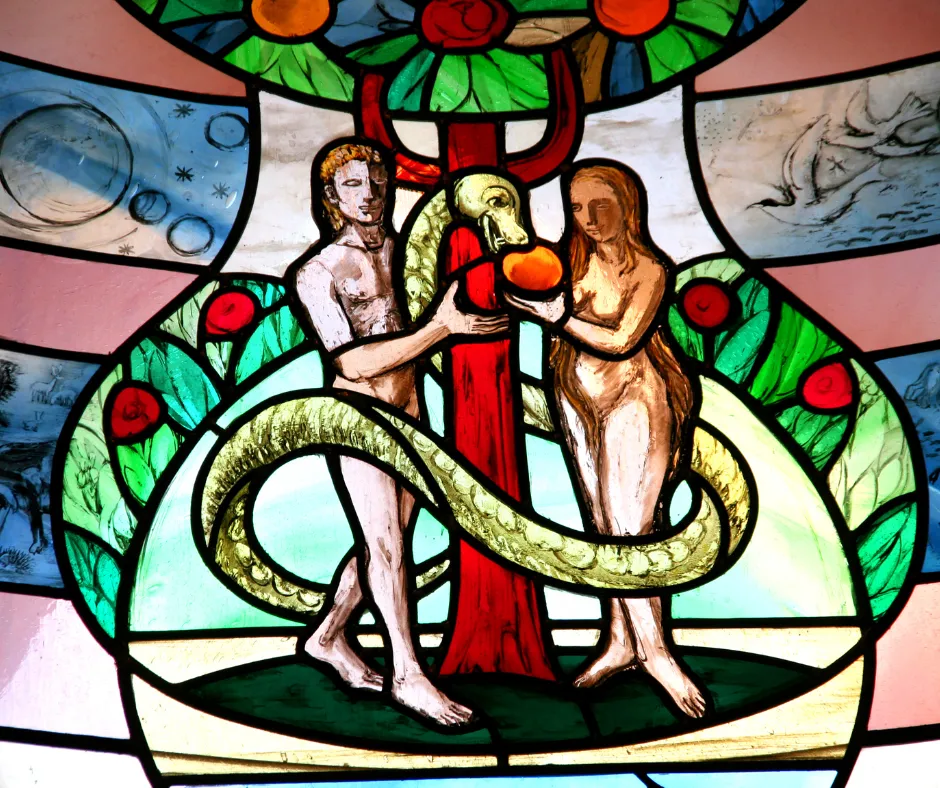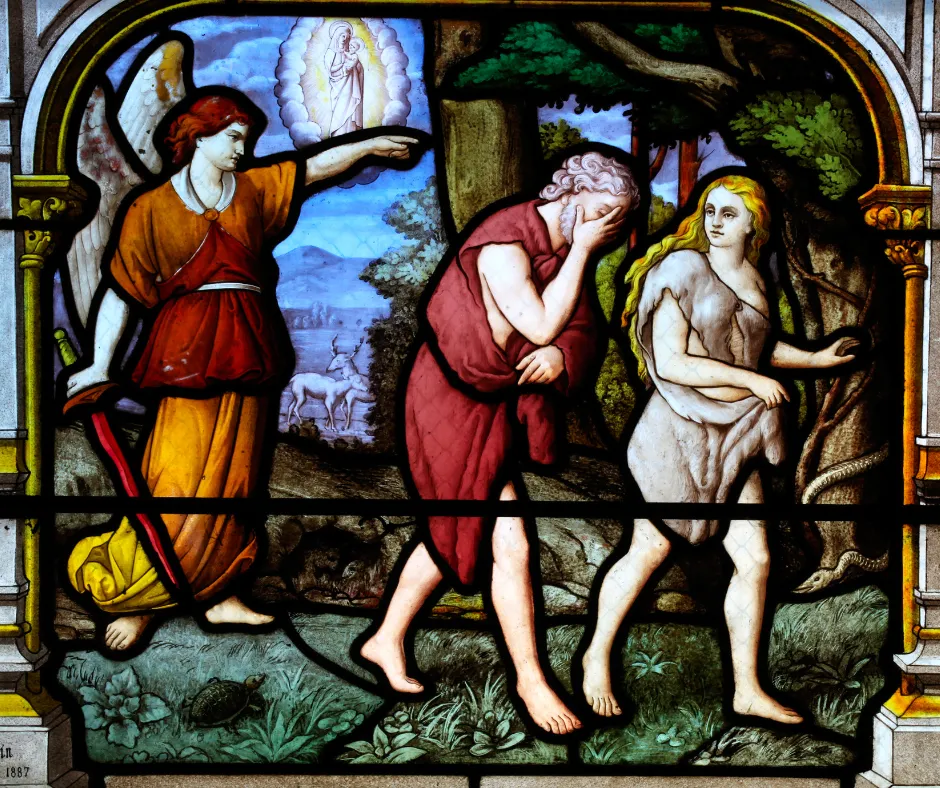In the vast tapestry of Christian theology, few figures hold as much significance as Adam and Eve. As the first human beings created by God, their story serves as the foundation upon which our understanding of humanity’s relationship with our Creator is built. From the idyllic paradise of the Garden of Eden to the tragedy of their fall through disobedience, Adam and Eve embody the complexities of human nature, the consequences of sin, and our desperate need for redemption. Their lives not only shape our understanding of the origins of mankind but also set the stage for the exploration of their eternal destiny. Scripture tells us that through one man, sin entered the world, but it also offers glimpses of hope and the promise of restoration. Join us as we embark on a journey of deep reflection and discovery, as we unravel the enigma of Adam and Eve’s eternal destiny and seek to understand the profound implications it holds for our own lives.

The Story of Adam and Eve
In the book of Genesis, we encounter the exquisite description of God’s act of creation: “Then the Lord God formed a man from the dust of the ground and breathed into his nostrils the breath of life, and the man became a living being” (Genesis 2:7, NIV). From the beginning, we see God’s intimate involvement in our formation, shaping us with His hands and breathing life into us.
But the story doesn’t end there. God recognized that it was not good for man to be alone, so He created Eve, the first woman, as a suitable partner for Adam. This act of divine companionship illustrates humanity’s inherent relational nature, reflecting our triune God’s image. Adam and Eve were also entrusted with the stewardship of the Garden of Eden and given dominion over all creation (Genesis 1:28).
However, their existence was soon tested by the serpent, who cunningly tempted Eve with the forbidden fruit from the tree of the knowledge of good and evil. The serpent questioned God’s command, sowing doubt in Eve’s heart with the enticing promise of becoming like God. Sadly, Adam and Eve succumbed to the temptation, eating the fruit and plunging humanity into sin and brokenness. The consequences were severe, as they faced expulsion from the garden and a life marked by toil, pain, and separation from God (Genesis 3:16-24).

The Consequences of the Original Sin
The consequences of the original sin committed by Adam and Eve reverberate throughout human history, profoundly impacting our relationship with God and the state of our fallen world. Adam and Eve’s disobedience led to a rupture in their and our perfect communion with God.
Scripture speaks to the significance of sin that entered the world through one man, Adam; Romans 5:12 tells us, “Therefore, just as sin entered the world through one man, and death through sin, and in this way death came to all people because all sinned.” The fall introduced a corrupt nature into the heart of humanity, tarnishing our ability to live in perfect harmony with God’s righteous standards. Indeed, the apostle Paul reminds us that “all have sinned and fall short of the glory of God” (Romans 3:23, NIV). Sin distorts our thinking, corrupts our desires, and separates us from the loving presence of our Creator.
The repercussions of the original sin extend beyond our individual lives. Scripture reveals that even creation was subjected to futility due to Adam and Eve’s transgression (Romans 8:20). We see the brokenness and suffering evident in the natural world around us – from disease and death to natural disasters and environmental decay. The introduction of sin has marred the beauty of God’s creation, leaving us longing for restoration.
Furthermore, the consequences of the original sin have fractured our relationships with one another. Envy, strife, injustice, and selfishness pervade our interactions, causing pain and division. We see the devastating effects of sin in broken families, shattered communities, and nations torn apart by conflict.

Adam & Eve’s Eternal Destiny: Reasons Why They Did Not Get into Heaven
As we explore the eternal destiny of Adam and Eve, it is essential to consider both perspectives and engage in honest theological reflection. While we recognize the impact of their original sin on humanity, we must also grapple with whether they attained heaven following their disobedience and expulsion from the Garden of Eden.
One argument against Adam and Eve’s inclusion in heaven stems from the lack of explicit repentance in the biblical narrative. After their disobedience, there is no clear indication that they sought forgiveness or turned back to God in genuine remorse. In fact, when confronted by God, Adam promptly shifted the blame onto Eve while Eve, in turn, shifted the blame onto the serpent. In Genesis 3:12-13, it is recorded that Adam said, “The woman you put here with me—she gave me some fruit from the tree, and I ate it,” and then the Lord God said to the woman, “What is this you have done?” The woman replied, “The serpent deceived me, and I ate.” Their failure to take responsibility for their actions raises questions about their repentant hearts and willingness to seek reconciliation with God.
Additionally, the consequences of their sin were significant. They were banished from the garden, separated from the direct presence of God, and subjected to the hardships of a fallen world. In Genesis 3:23-24, we read that “God banished [Adam] from the Garden of Eden to work the ground from which he had been taken.” This was a permanent consequence of their disobedience and implies that their eternal destiny may have been affected by their actions.
Furthermore, certain biblical passages hint at the exclusion of Adam and Eve from heaven. For instance, in Romans 5:12, the apostle Paul states that “sin entered the world through one man, and death through sin.” This passage implies that the effects of sin and its consequences, including death, extended to all of humanity. This raises the possibility that Adam and Eve’s original sin disqualified them from eternal life.
We must remember, however, to approach this topic with humility and acknowledge that our understanding of eternal destiny is ultimately in God’s hands. Scripture reveals a loving and merciful God who desires the redemption of all people. While we may identify reasons against Adam and Eve’s inclusion in Heaven based on their actions and the consequences of their sin, we also recognize that God’s grace is not limited by our human understanding.

Adam & Eve’s Eternal Destiny: Reasons Why They Did Get into Heaven
One key piece of evidence supporting the possibility of Adam and Eve’s entry into heaven is found in Genesis 3:21. After their disobedience, God made garments of skin for Adam and Eve to clothe them. This act of provision, which required the shedding of blood, foreshadows the sacrificial system established in later Old Testament times. It serves as a symbol of God’s grace and desire to cover their shame through atonement.
This suggests the potential for their sins to be forgiven and their relationship with God to be restored.
Moreover, God’s character throughout Scripture reveals His love, mercy, and desire for reconciliation with His creation. In 2 Peter 3:9, we read that “The Lord is not slow in keeping his promise, as some understand slowness. Instead he is patient with you, not wanting anyone to perish, but everyone to come to repentance.” This passage speaks to God’s longing for all people, including Adam and Eve, to turn to Him in repentance and experience salvation.
Additionally, the overarching story of redemption in the Bible centers on Jesus Christ, who came to reconcile humanity with God. In Romans 5:19, the apostle Paul draws a parallel between Adam’s disobedience and Jesus’ obedience, stating, “For just as through the disobedience of the one man the many were made sinners, so also through the obedience of the one man the many will be made righteous.” This verse suggests that the redemptive work of Christ has the power to overcome the consequences of Adam and Eve’s original sin.
While there may be reasons to question Adam and Eve’s inclusion in heaven, it is crucial to remember that God’s mercy and grace are boundless. His desire is to reconcile all of creation to Himself. In light of the biblical clues that point to redemption and forgiveness, we can hold onto hope and trust in God’s ability to restore even those who have fallen short.
Ultimately, the eternal destiny of Adam and Eve lies in the hands of a loving and just God who sees the depths of their hearts. As we engage in this discussion, let us approach it with humility and a recognition that God’s ways are higher than our own. May we find comfort in the vastness of God’s grace and the power of His redemptive work through Jesus Christ.

The Hope of Redemption
When we look specifically at Adam and Eve, we find evidence of God’s redemptive plan. In Genesis 3:15, God promises a future Redeemer: “And I will put enmity between you and the woman, and between your offspring and hers; he will crush your head, and you will strike his heel.” These words, often referred to as the protoevangelium, point to Jesus Christ, the ultimate fulfillment of the promise. God’s plan for redemption extends beyond the immediate consequences of Adam and Eve’s sin.
Furthermore, we must consider the sacrificial system established by God in the Old Testament. In Leviticus 16, God institutes the Day of Atonement, where the high priest would make atonement for the sins of the people. This ritual involved the shedding of blood and symbolized the covering of sins. Although Adam and Eve lived before the establishment of this system, we can see the foreshadowing of God’s redemptive plan even in their time.
It is essential to remember that God’s mercy and grace surpass our human understanding. In Isaiah 55:8-9, we are reminded, “For my thoughts are not your thoughts, neither are your ways my ways… As the heavens are higher than the earth, so are my ways higher than your ways and my thoughts than your thoughts.” This verse emphasizes that God’s plans and ways exceed our limited perspective.
While we may speculate on the extent of Adam and Eve’s redemption, it is crucial to approach this topic with humility. We trust in a loving and just God who desires the restoration of all people. He has demonstrated His willingness to pursue us relentlessly through His Son, Jesus Christ.
In conclusion, the hope of redemption is a foundational aspect of the Christian faith. Although we may question the specific details of Adam and Eve’s redemption, we find assurance in the overarching narrative of God’s redemptive plan throughout Scripture. As we explore this concept, let us remember that God’s mercy and grace know no limits. Let us hold onto the hope that, through Jesus Christ, even Adam and Eve can experience the transformative power of God’s redemption.


